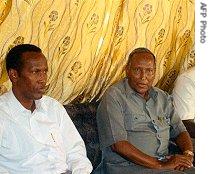2007年VOA标准英语-Somali Government Moves to Mogadishu(在线收听)
Nairobi
13 March 2007
Somali President Abdullahi Yusuf Tuesday moved to Somalia's volatile capital from the government's former base in Baidoa. Several hours later, witnesses reported seeing several mortar shells hitting Somalia's presidential residence in Mogadishu. Cathy Majtenyi reports for VOA from Nairobi.
 |
| Interim Somali President Abdullahi Yusuf Ahmed (R) with his PM Ali Mohamed Gedi during a media briefing in Mogadishu, 09 Jan 2007 |
The re-location applies to the president, Prime Minister, and ministers of Somalia's transitional government. Members of parliament will continue meeting in Baidoa.
Somali Minister of Foreign Affairs Esmael Mohamud Hurreh explains to VOA the reason for the move.
"We want to stabilize Mogadishu, and we cannot stabilize Mogadishu by being outside Mogadishu," he said. "We have to go in there with the reconciliation, bringing all Somalis together, at the same time having our security forces operating in the city."
Baidoa, a town some 220 kilometers northwest of the capital, was chosen in 2006 to be the government base after Yusuf refused to set up in Mogadishu, because of security concerns.
But now there are more than 1,000 Ugandan troops in Mogadishu as part of an African Union force deployed to bring stability to the volatile nation.
Among other things, the African Union troops are to protect the president and other government personnel as well as government operations.
The troops join Ethiopian soldiers who are still in Somalia. They had come to the country near the end of last year to back Somali government forces battling with the Islamic Courts Union.
Many of Mogadishu's buildings bear the scars of the country's long-running civil war that was sparked in 1991 following the ouster of Siad Barre.
Some of the buildings are partially or completely destroyed, while many are marked with bullet holes.
Foreign minister Hurreh says that the poor infrastructure poses a challenge to the government's move.
"We'll use some makeshift space to operate from," he added. "Some of the ministries can be refurbished very quickly. Some of them will have to be rebuilt."
Hurreh says the government will be aiming to build permanent government structures in the capital.
Somalia's transitional government was formed in neighboring Kenya more than two years ago following a peace process.